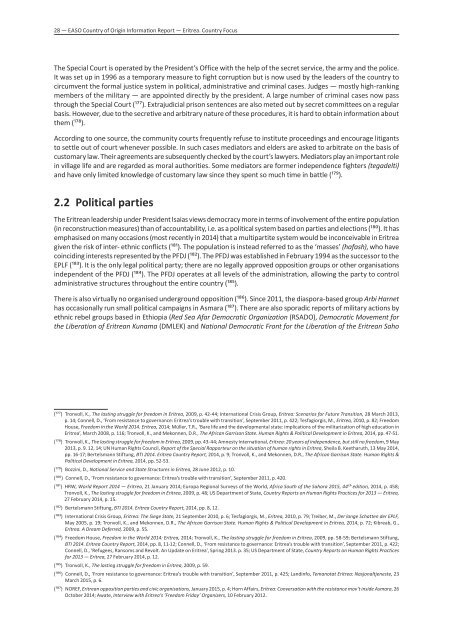You also want an ePaper? Increase the reach of your titles
YUMPU automatically turns print PDFs into web optimized ePapers that Google loves.
28 — EASO Country of Origin Information Report — Eritrea. Country Focus<br />
The Special Court is operated by the President’s Office with the help of the secret service, the army and the police.<br />
It was set up in 1996 as a temporary measure to fight corruption but is now used by the leaders of the country to<br />
circumvent the formal justice system in political, administrative and criminal cases. Judges — mostly high-ranking<br />
mem<strong>ber</strong>s of the military — are appointed directly by the president. A large num<strong>ber</strong> of criminal cases now pass<br />
through the Special Court (177). Extrajudicial prison sentences are also meted out by secret committees on a regular<br />
basis. However, due to the secretive and arbitrary nature of these procedures, it is hard to obtain information about<br />
them (178).<br />
According to one source, the community courts frequently refuse to institute proceedings and encourage litigants<br />
to settle out of court whenever possible. In such cases mediators and elders are asked to arbitrate on the basis of<br />
customary law. Their agreements are subsequently checked by the court’s lawyers. Mediators play an important role<br />
in village life and are regarded as moral authorities. Some mediators are former independence fighters (tegadelti)<br />
and have only limited knowledge of customary law since they spent so much time in battle (179).<br />
2.2 Political parties<br />
The Eritrean leadership under President Isaias views democracy more in terms of involvement of the entire population<br />
(in reconstruction measures) than of accountability, i.e. as a political system based on parties and elections (180). It has<br />
emphasised on many occasions (most recently in 2014) that a multipartite system would be inconceivable in Eritrea<br />
given the risk of inter- ethnic conflicts (181). The population is instead referred to as the ‘masses’ (hafash), who have<br />
coinciding interests represented by the PFDJ (182). The PFDJ was established in February 1994 as the successor to the<br />
EPLF (183). It is the only legal political party; there are no legally approved opposition groups or other organisations<br />
independent of the PFDJ (184). The PFDJ operates at all levels of the administration, allowing the party to control<br />
administrative structures throughout the entire country (185).<br />
There is also virtually no organised underground opposition (186). Since 2011, the diaspora-based group Arbi Harnet<br />
has occasionally run small political campaigns in Asmara (187). There are also sporadic reports of military actions by<br />
ethnic rebel groups based in Ethiopia (Red Sea Afar Democratic Organization (RSADO), Democratic Movement for<br />
the Li<strong>ber</strong>ation of Eritrean Kunama (DMLEK) and National Democratic Front for the Li<strong>ber</strong>ation of the Eritrean Saho<br />
(177) Tronvoll, K., The lasting struggle for freedom in Eritrea, 2009, p. 42-44; International Crisis Group, Eritrea: Scenarios for Future Transition, 28 March 2013,<br />
p. 14; Connell, D., ‘From resistance to governance: Eritrea’s trouble with transition’, Septem<strong>ber</strong> 2011, p. 422; Tesfagiorgis, M., Eritrea, 2010, p. 82; Freedom<br />
House, Freedom in the World 2014. Eritrea, 2014; Müller, T.R., ‘Bare life and the developmental state: implications of the militarization of high education in<br />
Eritrea’, March 2008, p. 116; Tronvoll, K., and Mekonnen, D.R., The African Garrison State. Human Rights & Political Development in Eritrea, 2014, pp. 47-51.<br />
(178) Tronvoll, K., The lasting struggle for freedom in Eritrea, 2009, pp. 43-44; Amnesty International, Eritrea: 20 years of independence, but still no freedom, 9 May<br />
2013, p. 9. 12, 14; UN Human Rights Council, Report of the Special Rapporteur on the situation of human rights in Eritrea, Sheila B. Keetharuth, 13 May 2014,<br />
pp. 16-17; Bertelsmann Stiftung, BTI 2014. Eritrea Country Report, 2014, p. 9; Tronvoll, K., and Mekonnen, D.R., The African Garrison State. Human Rights &<br />
Political Development in Eritrea, 2014, pp. 52-53.<br />
(179) Bozzini, D., National Service and State Structures in Eritrea, 28 June 2012, p. 10.<br />
(180) Connell, D., ‘From resistance to governance: Eritrea’s trouble with transition’, Septem<strong>ber</strong> 2011, p. 420.<br />
(181) HRW, World Report 2014 — Eritrea, 21 January 2014; Europa Regional Surveys of the World, Africa South of the Sahara 2015, 44th edition, 2014, p. 458;<br />
Tronvoll, K., The lasting struggle for freedom in Eritrea, 2009, p. 48; US Department of State, Country Reports on Human Rights Practices for 2013 — Eritrea,<br />
27 February 2014, p. 15.<br />
(182) Bertelsmann Stiftung, BTI 2014. Eritrea Country Report, 2014, pp. 8, 12.<br />
(183) International Crisis Group, Eritrea: The Siege State, 21 Septem<strong>ber</strong> 2010, p. 6; Tesfagiorgis, M., Eritrea, 2010, p. 79; Trei<strong>ber</strong>, M., Der lange Schatten der EPLF,<br />
May 2005, p. 19; Tronvoll, K., and Mekonnen, D.R., The African Garrison State. Human Rights & Political Development in Eritrea, 2014, p. 72; Kibreab, G.,<br />
Eritrea. A Dream Deferred, 2009, p. 55.<br />
(184) Freedom House, Freedom in the World 2014: Eritrea, 2014; Tronvoll, K., The lasting struggle for freedom in Eritrea, 2009, pp. 58-59; Bertelsmann Stiftung,<br />
BTI 2014. Eritrea Country Report, 2014, pp. 8, 11-12; Connell, D., ‘From resistance to governance: Eritrea’s trouble with transition’, Septem<strong>ber</strong> 2011, p. 422;<br />
Connell, D., ‘Refugees, Ransoms and Revolt. An Update on Eritrea’, Spring 2013. p. 35; US Department of State, Country Reports on Human Rights Practices<br />
for 2013 — Eritrea, 27 February 2014, p. 12.<br />
(185) Tronvoll, K., The lasting struggle for freedom in Eritrea, 2009, p. 59.<br />
(186) Connell, D., ‘From resistance to governance: Eritrea’s trouble with transition’, Septem<strong>ber</strong> 2011, p. 425; Landinfo, Temanotat Eritrea: Nasjonaltjeneste, 23<br />
March 2015, p. 6.<br />
(187) NOREF, Eritrean opposition parties and civic organisations, January 2015, p. 4; Horn Affairs, Eritrea: Conversation with the resistance mov’t inside Asmara, 26<br />
Octo<strong>ber</strong> 2014; Awate, Interview with Eritrea’s ‘Freedom Friday’ Organizers, 10 February 2012.


